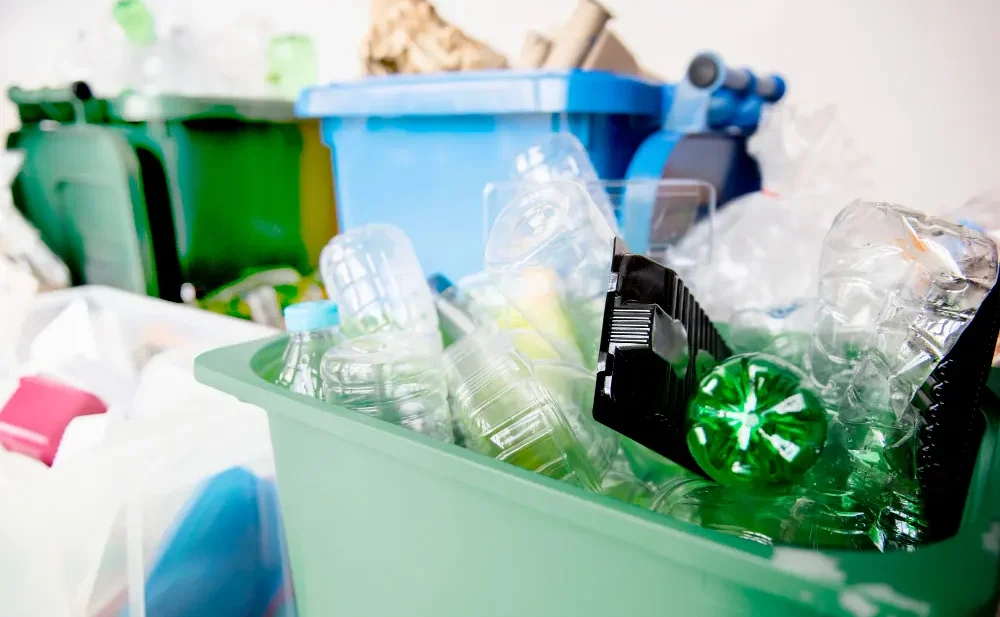NEW DELHI: After partially lifting the ban on import of plastic waste a few months back, the government has now annually allowed recyclers to import 95, 105 tonnes of PET flakes to feed their plants even as domestic waste collectors and environmentalists express concerns saying the move will actually dilute India’s existing policy on dealing with plastic waste causing more littering and pressure on landfills.
PET (Polyethylene Terephthalate) bottles are a category of single use plastic of which nearly 90% of the domestic supply is already recycled. The government had in 2019 imposed a ban on its import as an attempt to promote
domestic waste collection and encourage recyclers to use plastic waste available within the country. The move was then seen as being supportive of rag – pickers as well as recycling industries.
The three-year ban was, however, partially lifted in March, allowing only PET flakes to be imported. Since the import was opposed by many stakeholders, including Recycle India Foundation and Mumbai-based Pandit Deendayal
Upadhyay Smiriti Manch (PDUSM), the issue was referred by the environment ministry to a technical review committee which has now recommended import with certain specific conditions. The ministry accepted the recommendations, allowing import of 95,105 tonnes of PET flakes, on August 24. The committee argued that the decision kept in mind the need for sustaining a robust recycling chain to balance adequate availability of waste PET to recyclers. It also flagged that the recycling sector acts as an anchor for the collection agents, and without a robust recycling sector, the collection effort cannot be sustained.
Environmentalists and other stakeholders, however, don’t buy this argument. “The move to allow import of PET waste dilutes the existing policy for plastic waste. Almost all the PET bottles in India are recycled to make polyester fibres. Polyester (textile) waste is not considered as plastic waste when it reaches the end of its life. So we are
essentially talking about pushing plastic waste into the textile waste stream with zero accounting and
accountability,” said Siddharth G Singh, programme manager, Centre for Science and Environment (CSE).
Moreover, Singh apprehended, the plastic waste recyclers, who are the only stakeholders authorised to issue Extended Producer Responsibility (EPR) certificates, will now be able to issue certicates to companies without
actually collecting PET waste that is generated within the country. Before recommending import of PET flakes only (and not waste PET bottles) with certain conditions, the technical review committee (TRC) of the ministry
claimed to have deliberated on the issue in detail and heard views of representatives from Recycle India Foundation (RIF), All India Recycled Fibre & Yarn Manufacturers Association (AIRFYMA) and the PDUSM. Raising their broader concerns, these organisations flagged that the decision to allow import will result in lower requirement of
local PET waste. It’ll adversely impact the livelihood of 40-50 lakh rag – pickers across the country as they are dependant on PET bottle waste as their primary source of income.
The stakeholders also claimed that the ban on import of PET flakes and PET bottle waste had helped India achieve 85 – 90% recycling rate for PET, which is one of the highest in the world. They apprehended that the recycling rate will now be reduced significantly due import of PET flakes. They also argued that the move will affect ‘clean
India’ mission as the locally generated waste will not be collected as the recyclers will shift towards imported waste. Besides looking at these concerns, the TRC also deliberated on recyclers’ concerns who claimed that the domestic PET consumption and collection had suffered a serious setback in 2020-21 on account of covid, resulting in significantly falling down the capacity utilization of recyclers.
The committee in its recommendation to the ministry noted that the recycling sector acts as an anchor for the
collection agents, and without a robust recycling sector, the collection effort cannot be sustained. “At the same time, unbridled imports shall certainly adversely affect domestic collection,” it said while expressing the need to arrive at a solution so that neither domestic collection, nor capacity utilization are hampered.
The TRC finally recommended allowing import of PET flakes only subject to following five conditions:
- A unit should be eligible for import only if it has used domestic waste to the extent of at least 70% of the capacity in the previous year (e.g production of 2021-22 to be considered for 2022 – 23 permissions).
- The imports for the year 2022-23 should be restricted to 20% of the production in the year 2021 – 22 and
thereafter, 15% of the actual capacity utilised in the preceding year. - An additional import up to 10% may be considered against exports of the products.
- Units would be eligible for import after at least one year of production.
- The decision may be reviewed after 1 year for continuation of import of PET flakes. The ministry has accepted these recommendations. Before the ban was imposed in 2019, India recyclers had been importing PET waste / flakes
from China and many developed countries including the US, Canada, Germany, Italy and Japan.
(Source: TIMES OF INDIA, MUMBAI– 9 September, 2022)

